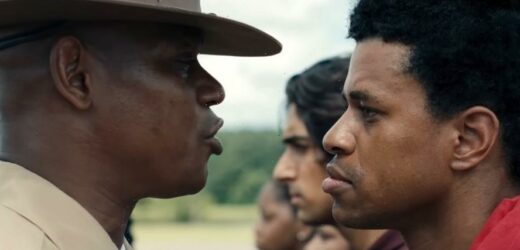After a day of filming on “The Inspection,” Bokeem Woodbine would occasionally stroll into his hotel lobby and see the young actors who play Marines under his supervision “carrying on and having a great time.”
In person, director Elegance Bratton says, Woodbine is both “effortlessly funny” and a true gentleman, “caring and regal in his carriage like Sidney Poitier, with a real sweetness” and in a recent interview he was soft-spoken and thoughtful. But in the film, Bratton’s moving autobiographical story about a gay homeless young man who finds self-worth by proving himself in the Marine Corps boot camp, Woodbine plays head drill instructor Leland Laws, who rides all the young recruits but nearly self-destructs as he targets his venom on Bratton’s alter ego, Ellis French (Jeremy Pope).
Yet Woodbine’s take is more nuanced than clichéd — Bratton praises a brief smirk during a crucial confrontation with French that “communicates all of his complexities” — but he’s still an imposing and even cruel taskmaster.
So while he found this group of actors to be “really good cats” whom he’d normally love to hang out with, he’d stride past them and say sternly, “Stop screwing around. You guys need to take your asses to bed, we’ve got to get up early.” And, Woodbine recalls with a chuckle, they would respond respectfully with a “Yes, sir.”
Woodbine is probably best-known for his role as Fathead Newman in “Ray” and his Emmy-nominated turn as mobster Mike Milligan in the TV series of “Fargo,” but he has been acting steadily for three decades and prepares assiduously for each role.
Initially, Woodbine planned to rewatch films with renowned drill sergeants, most notably “Full Metal Jacket,” but stopped himself. “I said to myself, subconsciously, it’s better to have my own organic interpretation of who this man is,” he says. “I didn’t want to lean into just the mannerisms or trope that audiences would find familiar.”
Instead, “after realizing Elegance had mined the experiences he had endured and observed,” he relied heavily instead on Bratton’s personal take. “There was push and pull from time to time, but he was remarkable in his ability to give free rein to the actors and let go but also to rein things in.”
Laws is, to a large extent, the villain of the film, but Woodbine refused to see him that way. “I made up my mind a long time ago to root for my characters no matter how despicable they might be,” he says. “I’m never trying to qualify their actions or judge them. I always think they’re right because more often than not they think they’re right.”
The drill sergeant cares almost too passionately about his underlings. “There is a love in him for these young servicemen who at any given moment are going to have to engage in hyperviolence and suffer wounds and potentially lose their life,” Woodbine says. He explains that he worked on developing an understanding of what drove Laws to commit
so heavily to these youngsters and transforming them into Marines that he would develop the “blind spot in his moral compass” that fuels much of the film’s dramatic tension.
And while Woodbine has never served in the military, he understood the danger of tunnel vision. “In the past, I’ve been trying to do work, and other things can fall by the wayside because the role is of the greatest importance in that moment and it’s as if nothing else matters,” he says. “I could relate to his isolation and that he feels like nobody cares as much as he does.”
Read More About:
Source: Read Full Article


